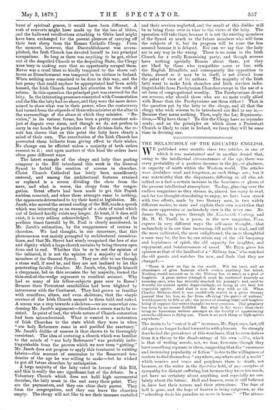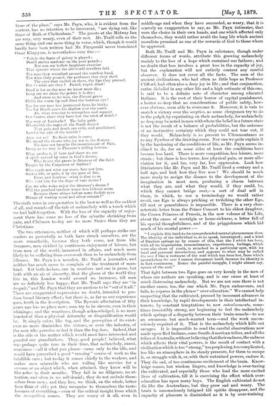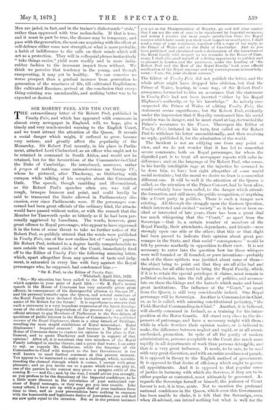THE MELANCHOLY OF THE EDUCATED ENGLISH.
WE published some months since two articles, in one of which it was maintained and in another denied that, owing to the intellectual circumstances of the age, there was every probability of a positive decrease in the joy, or gladness, or capacity of mirth within the Western world. The articles were doubtless read and forgotten, as such things are ; but it was noteworthy that the disputants, differing on all else, ad- mitted as a fact a certain increase in the heaviness or gloom of the present intellectual atmosphere. To-day, glancing over the endless magazines as they stream in, almost too many to read, and far too thought-stimulating to enjoy, we have been struck with two efforts, made by two literary men, in two widely different modes, to state and explain their own conviction that the more oppressive or melancholy view is the truer one.. Mr. James Payn, in prose, through the Nineteenth Cent my, and Mr. H. D. Traill, in a poem, iu the new magazine, Time, express in very different ways the self-same thought,—that melancholy is in our time increasing, till mirth is dead, and till the more cultivated, the more enlightened, the more thoughtful a man may be, the less he can retain any of the old buoyancy and boyishness of spirit, the old capacity for laughter, and enjoyment, and boisterousness of mood. Mr. Payn gives his opinion as that of the landlord of a " Midway Inn," who watched the old guests and watches the new, and finds that they are changed "There is now no fun in the world. Wit we have, and an abundaace of grim humour, which evokes anything but mirth. Nothing would astonish us in the Midway Inn so much as a peal of laughter. A great writer (though it must be confessed scarcely an amusing one), who has recently reached his journey's end, used to describe his animal spirits depreciatingly, as being at the best but vegetable spirits. And that is now the way with us all. When Charles Dickens died, it was confidently stated in a great literary journal that his loss, so far from affecting the gaiety of nations,' would scarcely be felt at all ; the power of rousing tears and laughter being (I suppose the writer thought) so very common. That prophecy has been by no means fulfilled. But what is far worse than there being no humorous writers amongst us, the faculty of appreciating even the old ones is dying out. There is no such thing as high-spirits anywhere."
The desire to be " out of it all " increases, Mr. Payn says, fast, till old age is no longer looked forward to with pleasure. So strongly does he feel the prevalence of this weariness, that he even derives from it a theory to the disadvantage of his own metier, which is that of writing novels, not, we fear, first-rate, though they have something separate in them, suggesting that the " enormous and increasing popularity of fiction " is due to the willingness of readers to find themselves " anywhere, anywhere out of a world " which wearies and vexes and perplexes them to death, not because, as the writer in the Spectator held, of any overplus of sympathy for distant suffering, but because they know too much, yet have no certainty about anything, and especially no cer- tainty about the future. Hell and heaven, even if still believed in, have lost their terrors and their attractions. The fear of hell is gone, and the hope of heaven is being outgrown, as the " schoolboy finds his paradise no more in home." "The attrac- tions of the place," says Mr. Payn, who, it is evident from the context, has no intention to be irreverent, " are dying out, like those of Bath or Cheltenham." The guests at the Midway Inn are very, very weary, even of their rest. Mr. Trail tells us the same thing, and one more thing iu verse, which, though it would hardly have been written had Mr. Fitzgerald never translated Omar Khayyam, is nevertheless very fine :-
"Vainly the farce of gaiety is played ; Death smiles sardonic on the poor parade ; Nor can our hollow laughters exorcise
That spectre whom the old-world revellers laid.
The rose they wreathed around the careless head, The wine they poured, the perfumes that they shed, The eyes that smiled on them, the lips they pressed, For vs what are they ? Faded, vapid, dead!
Dead is for us the rose we know must die ; Long ere we drain the goblet it is dry ; And even as we kiss, the distant grave Chills the warm lip and dims the lustrous eye!
Too far our race has journeyed from its birth ; Too far Death casts his shadow o'er the earth. Ah, what remains to strengthen and support Our hearts, since they have lost the trick of mirth ?
The stay of fortitude ? The lofty pride Wherewith the sages of the Porch denied That pain and death are evils, and proclaimed
Lawful the exit of the suicide
Alas, not so! No Stoic calm is ours; We dread the thorns who joy not iu the flowers. We dare not breathe the mountain-air of Pain, Droop as we may in Pleasure's stifling bowers.
What profits it, if here and there we see A spirit nerved by trust in God's decree,
Who fronts the grave in firmness of the faith Taught by the Carpenter of Galilee ?
Who needs not wine nor roses, lute nor lyre, Scorns life, or quits it by the gate of fire, Erect and fearless—what is that to us Who hold him for the dupe of vain desire ?
Can we who wake enjoy the dreamer's dream ? Will the parched treeless waste less hideous seem Because there shines before some foolish eyes Mirage of waving wood and silver stream?"
The sixth verse in our quotation is the best as well as the saddest of all, and rounds-off the tale of melancholy with a touch which we had half-forgotten. With the loss of the capacity of enjoy- ment there has conic no loss of the sybarite shrinking from pain, and Clubmen to-day are no more Stoics than they are Christians.
The two utterances, neither of which will perhaps strike our readers as powerfully as both have struck ourselves, are the more remarkable, because they both come, not from idle dreamers, men sicklied by continuous enjoyment of leisure, but from men of the world, immersed in affairs, and much more likely to be suffering from over-work than to be melancholy from idleness. Mr. Payn is a novelist, Mr. Traill a journalist, and neither has much cause to complain of the treatment of man- 'kind. Yet both declare, one in numbers and one in prose, but both with an air of sincerity, that the gloom of the world they live in, this London world around us, increases, till men are so definitely less happy, that Mr. Traill says they are "in despair," and Mr. Payn that they are anxious to be "out of it all." These are exaggerated expressions no doubt, intended to pro- duce broad literary effect ; but there is, as far as our experience goes, truth in the description. The Byronic affectation of fifty years ago has no place now ; men try to be sincere, even in their whinings ; and the weariness, though acknowledged, is no more boasted of than a physical deformity or disqualification would be. It simply exists like fog, and the perception of its exist- ence no more diminishes the virtues, or even the industry, of the men who perceive or feel it than the fog does. Indeed, that is the side of the matter which would most have interested and puzzled our grandfathers. They, good people ! believed, what was perhaps quite true in their time, that melancholy, ennui, weariness—call it what you please—came only to the idle, and would have prescribed a good " rousing " course of work as the infallible cure ; but to-day it comes chiefly to the workers, and makes men miserable who are toiling like navvies for a success or an object which, when attained, they know will be like ashes in their mouths. They fail in no diligence, no at- tention, and often in no self-denial ; they do not seclude them- selves from men ; and they live, we think, on the whole, better
lives than of old ; yet they recognise to themselves the taste- lessness of everything,—even of the critical insight from which the recognition comes. They are weary of it all, even in
middle-age and when they have succeeded, so weary, that it is scarcely an exaggeration to say, as Mr. Payn intimates, that were the choice in their own hands, and one which affected only themselves, they would rather avoid the long life which ancient moralists promised as one of the rewards of God to those whom he approved.
Both Mr. Trail and Mr. Payn in substance, though under different forms of words, attribute this growing melancholy mainly to the loss of a hope which sustained our fathers ; and no doubt that loss involves a great loss in the capacity of joy, but the explanation will not entirely content any careful observer. It does not cover all the facts. The men of the ancient civilisations, who had often as little hope as Professor Clifford, had often also a deep joy in life ; and that conjunction, entire disbelief in any other life and a high estimate of this one, is said to be a definite note of character among educated Italians. It is the root of their horror of capital punishment, a horror so deep that no considerations of public safety, how- ever obvious, seem able to overcome it. Moreover, it is vain to snatch a victory over the sceptics, as some clergymen try to do in the pulpit, by expatiating on their melancholy, for melancholy as deep may be noted in men with whom the belief in a future state is not the result of a balance of probabilities, but the outcome of an instinctive certainty which they could not tear out, if they would. Melancholy is as present to Ultramontanes as to any Pyrrhos of the drawing-room. Nor can we quite explain it by the hardening of the conditions of life, as Mr. Payn seems in- clined to do, for on some sides at least the conditions have become less hard. There is more competition, less leisure, more strain ; but there is less terror, less physical pain, or more alle- viation for it, and far, very far, less oppression. Look how litterateurs like Mr. Payn and Mr. Traill lived a century and a half ago, and look how they live now ! We should be much more ready to assign the disease to the development of the imagination in most men, producing a chasm between what they are, and what they would, if they could, be, which they cannot bridge over,—a sort of dual self in them, in which, to use a terminology we would rather avoid, one Ego is always pricking or twitching the other Ego, till rest or peacefulness is impossible. There is a very char- acteristic letter from the Prince Consort to his eldest daughter, the Crown Princess of Prussia, in the new volume of his Life, about the cause of nostalgia or home-sickness, a letter full of his special thoughtfulness, and of the priggishness which hid much of his mental power :-
" I explain this hard-to-be-comprehended mental phenomenon thus. The identity of the individual is, so to speak, interrupted ; and a kind of Dualism springs up by reason of this, that the I which has been, with all its impressions, remembrances, experiences, feelings, which were also those of youth, is attached to a particular spot, with its local and personal associations, and appears to what may be called the new I like a vestment of the soul which has been lost, from which nevertheless the new I cannot disconnect itself, because its identity is in fact continuous. Hence the painful struggle, I might almost say, spasm of the soul."
That fight between two Egos goes on very keenly in the men of whom our authors are speaking, and is one cause at least of much distressing melancholy. But we are not sure there is not another cause, too, the one which Mr. Payn endeavours, and fails, to express in the phrase " over-education." We cannot help suspecting that the cultivated, pressed by incessant advances in their knowledge, by rapid developments in their intellectual in- terests, by constant temptations to new entrainements, some- times irresistibly strong, are beginning to feel the melancholy which springs of a disparity between their brain-muscle—to use an erroneous but much-wanted term—and the work uncon- sciously required of it. That is the melancholy which kills out savages. It is impossible to read the careful observations now made upon Red Indians, some South-American tribes, and all the tribes of Australia,without believing that their sadness, the sadness which affects their vital powers, is the result of contact with a civilisation which is too " strong," too perplexing, too complicated, too like an atmosphere in its steady pressure, for them to escape it, or struggle with it, or, with their untrained powers, endure it. They die sad, of too continuous excitement of the brain. Know- ledge comes, but wisdom lingers, and knowledge is over-taxing the cultivated, and especially those who lead the more excited lives of cultivation, till it is exercising the effect which over- education has upon many boys. The English cultivated do not die like the Australians, but they grow sad and weary. The brain is unconsciously fatigued till spirits disappear, and the capacity of pleasure is diminished as it is by over-training
Men are jaded, in fact, and in the trainer's dialectma.de " stale," rather than oppressed with true melancholia. If that is true, and it must in part be true, the disease may be temporary, and pass with the generation, the next one acquiring with the effort at self-defence either some new strength, or what is more probable, a habit of indifference to the calls on their minds which will act as a protection. They will in colloquial phrase instinctively " take things easier," yield more readily and in more india- rubber fashion to the incessant impact from without. We think we perceive that tendency in the young, and though exasperating, it may yet be healthy. We can conceive no worse prospect than a gradual increase from generation to generation of the weariness of life, till cultivated Englishmen, like cultivated Russians, arrived at the conclusion that every- thing existing was unendurable, and nothing better was to be expected or desired.




































 Previous page
Previous page